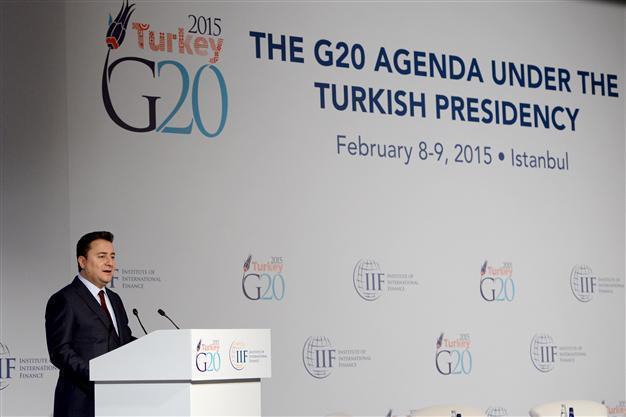Istanbul G-20 meeting starts with growth focus
ANKARA - Anadolu Agency

Turkish Deputy Prime Minister Ali Babacan delivers a speech in Istanbul during yesterday’s ‘G-20 Agenda Under Turkish Presidency’ meeting. AA Photo
Finance ministers and central bankers face a tough task coordinating action to spur global growth at G-20 meetings this week, with major economies running at different speeds and monetary policies diverging.
Concern over the ability of the United States to sustain the global economy as most other parts of the world slow will be high on the agenda as the Group of 20 leading economies hold talks in Istanbul today and tomorrow.
With Greece’s woes casting a shadow over Europe again, cheap oil playing havoc with inflation and growth forecasts, and the strengthening dollar posing a threat to emerging market economies, the meetings come at a critical time.
“There is a lot at stake,” IMF Managing Director Christine Lagarde said in a blog post published on Feb. 6.
“Without action, we could see the global economic supertanker continuing to be stuck in the shallow waters of sub-par growth and meagre job creation.”
Turkey’s Deputy Prime Minister Ali Babacan, who is in charge of the economy, has said tackling sluggish global growth and giving low income nations more voice will be priorities for Turkey’s G-20 presidency.
The former will be easier said than done.
U.S. Treasury Secretary Jack Lew said last week the United States could not be “the sole engine of growth” and a senior U.S. official said Washington’s message going into the meetings would again be that Europe is not doing enough.
Canadian Finance Minister Joe Oliver said “kick-starting global growth will be front and center” at the G-20 meetings.
“The euro area is confronting flat growth and deflation. Beyond Europe, the growth rates of key emerging economies, China and India, are losing steam,” Oliver said last week.
“Geopolitical crises, in Ukraine, Iraq, and Syria, pose serious risks, complicating the recovery ... And though America is carrying the world economy at the moment that is simply not sustainable.”
Germany, Europe’s largest economy, is likely to argue that rising domestic demand and plans to increase public spending show it is doing what it can, according to European sources familiar with the G-20 agenda.
Delicate balance Babacan has said that pushing G-20 member nations to meet reform commitments made at previous meetings would be key, a strategy he dubbed: “Keep your word, or explain”.
Coming good on commitments made at the G-20 summit in Brisbane last November could add more than $2 trillion to the global economy and create millions of new jobs over the next four years, Lagarde said.
The G-20 came into its own during the 2007-09 financial crisis when it put together a global stimulus package, but the challenge now is far more delicate, with diverging monetary policies one of the causes of the global turbulence.
The U.S. Federal Reserve looks set to raise interest rates this year, a stark contrast to impromptu cuts from India to Australia, Canada to Denmark, as well as China’s cut in bank reserve requirements and the abrupt end to the Swiss franc cap.
